
by Jessica Hughes | Mar 4, 2022 | General Featured
by Jessica Hughes

Fireplace: A fireplace is the centerpiece to the lounge where guests can mingle and enjoy social hour. Photo provided by Hotel Clio
The JW Marriott in Cherry Creek North embarked on a multi-million-dollar renovation and will make its transformation into the Hotel Clio, a Luxury Collection Hotel, on March 15, 2022.
Hotel Clio showcases a newly reimagined lobby, gathering spaces, and guest rooms and suites. The inspired urban oasis features the work of design-duo Mark Wilson and Yoko Ishihara of the California-based Wilson Ishihara, who drew on inspiration from the history of the hotel’s location.
“Hotels listed in Marriott’s luxury collection are typically rooted in the history of the area,” says Sean McNamara, the property’s director of sales and marketing. “So, while this isn’t a historical building itself, it is the first hotel in Cherry Creek and we sought to tell the story of the destination through its design.”
One such design element includes the lobby floor that is meant to resemble a riverbed glistening with flecks of gold and a marbled tile with tributary-like details. These and other unique design features combine the precise physical attributes of the confluence of the South Platte River and Cherry Creek nearby, along with the area’s history of the Gold Rush.

Rooms: Rooms with mountain views at Hotel Clio. Photo provided by Hotel Clio
The hotel features 193 luxurious rooms and six spacious suites, plus 10,000 square feet of event and meeting space. Rooms and suites feature five-piece marble bathrooms, spacious closets, pillow-top mattresses, and large picture windows for unobstructed views of the Front Range.
Inspired and connected through food and beverage, the hotel’s in-house restaurant, Toro Latin Kitchen & Lounge, replaces the long-standing Second Home restaurant. While not much of the set-up has changed the food has. In partnership with celebrity chef, Richard Sandoval, Toro is a culinary experience to be celebrated.
With menu items such as their Sweet Corn Empanadas, fresh ceviche, Bison Tiradito, and Blackened Tuna Tacos, there’s a little something for everyone. The restaurant also features a drink named the Casual Encounter, served in a stand-alone glass case complete with Laws four-grain bourbon and dry ice.
The restaurant is open for breakfast and dinner, or their Bottomless Weekend Brunch. The lobby bar allows guests to pull from their own personal stash by renting a Tequila locker where personal collections of high-end tequilas can be stored.
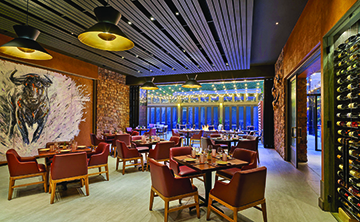
New Restaurant: The Toro dining room has replaced the long-standing Second Home restaurant in Denver’s Cherry Creek North. Photo provided by Hotel Clio
Clio will offer a concierge service, plus curated epicurean moments and experiences. Such experiences include happy hour mixology, guacamole demonstration, and a ceviche class at their ceviche bar (open to the public and guests for $25).
“As we transition into this new luxury hotel concept, we like to think of Hotel Clio as the Muse of Cherry Creek,” McNamara notes. “We want our guests to experience the same sense of inspiration that we all feel being connected to this incredible neighborhood.”
For more information, visit www.hotelcliocherrycreek.com.
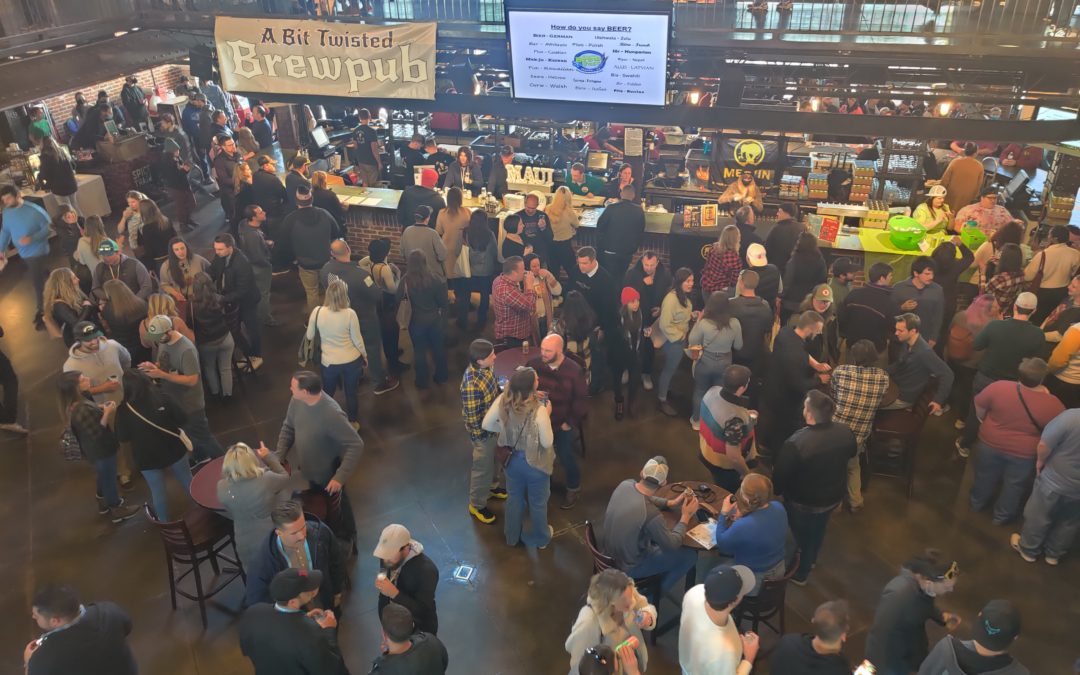
by Mark Smiley | Mar 4, 2022 | Travel
by Mark Smiley
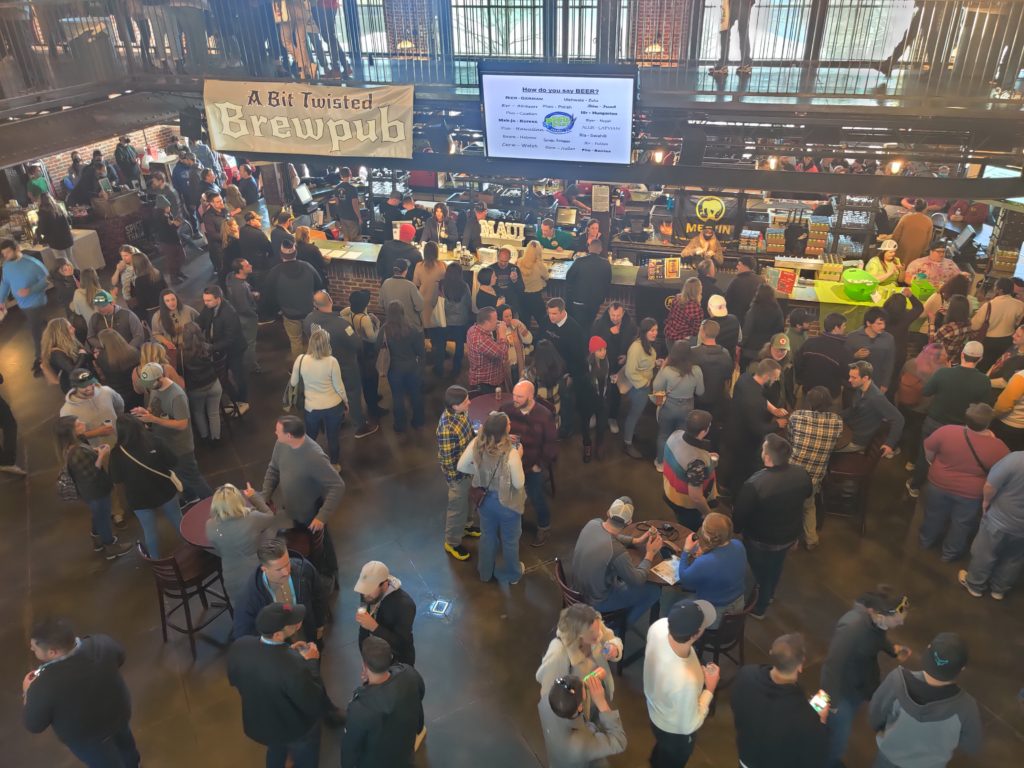
Bird’s Eye View: Winter Brew Fest capped the attendance which made for an enjoyable experience for all attendees.
Denver Winter Brew Fest was held on January 22, 2022, at Mile High Station. Over 40 craft breweries from around the state and a few from outside of Colorado were on hand each day to pour their winter beers.

Made Here: Amanda Kruczynski from Made Here Beer was in attendance at the Winter Brew Fest on January 22, 2022.
The event featured live music from Journey Girls during the afternoon session and Stone Beat Invasion for the evening session. These bands added to the already festive atmosphere. Food trucks flanked the event including Basic Kneads pizza which has been with the fest each Winter and Summer.
The first Denver Brew Fest by RightOn Productions was created in a parking lot near Coors Field. Since then, the Summer and the Winter Brew fests have developed into an annual Denver tradition at Mile High Station and now the celebrations have been expanded to Vail.
WeldWerks Brewing Company from Greeley had one of the most interesting and flavorful beers as they often do. They poured a Candy Cane White Chocolate Cheesecake Berliner which is a Berlin-style sour ale brewed with white chocolate, candy canes, cheesecake, vanilla, milk sugar, graham cracker and with natural flavors added.
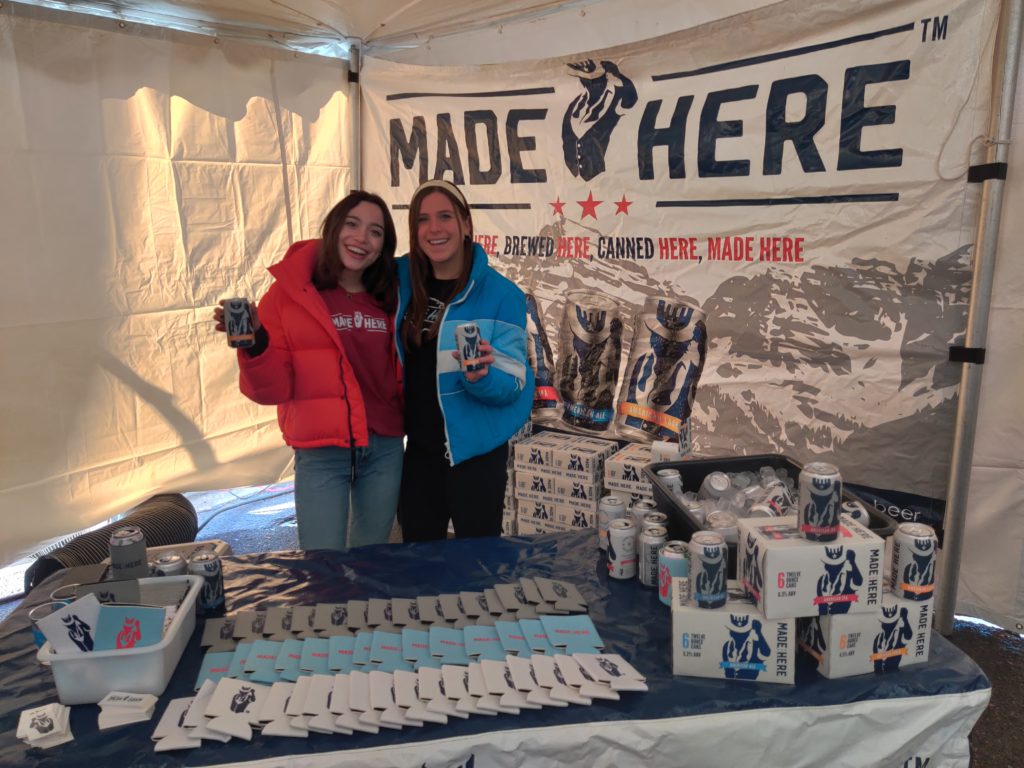
Impressive Display: Made Here had one of the best displays of any brewery at Winter Brew Fest.
A newcomer to the fest was Reverence Brewing Company which just opened last year at 17th and Franklin in City Park West. They poured two standout beers, a Cherry Wheat and a Hazy IPA. Long lines upstairs told you everything you needed to know about those beers.
Made Here Beer was also on hand for their second time. They had all three of their beers: lager, American Ale, and IPA available, along with plenty of giveaways for each attendee. Made Here is an American beer brewed in Colorado using 100% American ingredients.
The Summer and Winter Brew Fest held at Mile High Station has become an annual pilgrimage for many as it is a great way to sample many beers in a relaxed and festive atmosphere. “The Mile High Station is such a great venue and we have done both the winter and summer festivals for the past year,” said Amanda Kruczynski, Made Here Brand Lead. “It is really well organized and staffed and we feel like it is great exposure to the entire front range area for us to showcase our beer.”
Proceeds from the event benefited Big Bones Canine Rescue. For more information on all of the fests including the Summer Brew Fest coming July 23, 2022, visit www.brewfestevents.com.

by Glendale Sports Center | Mar 4, 2022 | Glendale City News
by Jennifer Lease, RD, CDN, Director of Nutrition Initiatives, YMCA of Metro Denver
 Eating more plant-based foods, which simply means food that comes from plants versus animals, can have great benefits for our health. This is because plant-based foods are filled with essential vitamins, minerals and fiber, an important nutrient we can only get from plants! These nutrients help support our health in tons of ways, from heart health to brain health, to keeping digestion running smoothly, to keeping your bones strong, your skin healthy, and just about anything else you can think of!
Eating more plant-based foods, which simply means food that comes from plants versus animals, can have great benefits for our health. This is because plant-based foods are filled with essential vitamins, minerals and fiber, an important nutrient we can only get from plants! These nutrients help support our health in tons of ways, from heart health to brain health, to keeping digestion running smoothly, to keeping your bones strong, your skin healthy, and just about anything else you can think of!
But eating more plant-based foods doesn’t mean you have to stop eating animal-based foods or adopt a vegan lifestyle. Here are some simple tips to start adding more plant foods into your usual meal routine:
- Swap one animal-based protein, like beef or pork, for a plant-based protein in one meal each week. You may have heard the phrase “meatless Monday” — a phrase that simply encourages you to enjoy one meatless meal per week. Our standard American way of eating tends to lean heavily on meats and many of us don’t eat enough plant foods, which can mean we’re lacking certain nutrients. A swap of just one meal per week can make a difference in supporting your health! Swap a beef or pork-based meal with a whole food plant-based protein like beans, lentils, or tofu. Not ready to dive into a fully plant-based meal? Try subbing out half of the animal protein for a plant protein.
- Keep it simple and convenient. There are tons of plant-based protein options available, and it can feel confusing on what to choose or how to cook those foods. Start off simple with a plant-based protein choice like canned beans or lentils, or options you can heat in a ready-to-cook pouch. These ready-to-eat plant-based proteins make it easy to toss into a meal. Try using canned beans or lentils as a topping for a salad or a whole grain, a replacement for taco night or add into a big, warm pot of chili or soup.
- Do a little advance planning to make it easy. Your meatless meal doesn’t need to be dinner. Maybe for you, lunch makes more sense. Everyone’s lifestyle and goals look different and planning ahead of time can help you choose what works best for you. This might mean you choose a new recipe to try with a plant-based protein for the week ahead, or you add a plant-based protein to your grocery list, so it makes it into your cart. It’s easy to fall into old habits, so when you’re working toward a new goal, like including more plant-based foods into your eating pattern, planning ahead can help you stay on track.
Remember: small changes lead to bigger, lasting changes over time! If you’re looking for support and motivation to get started with eating more plant-based foods, you might be interested in the YMCA of Metro Denver’s Meatless March Challenge during March’s National Nutrition Month. Through Facebook community, you’ll get to share pictures and recipes, tips and ideas on how to enjoy more meatless meals with support from YMCA Nutritionists!
Follow the YMCA of Metro Denver on Facebook at facebook.com/DenverYMCA and check out the Meatless March Challenge. 웷

by Charles Bonniwell | Mar 4, 2022 | Editorials
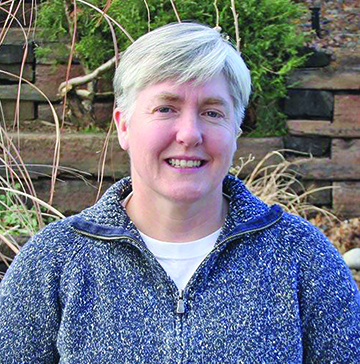
Dr. Dawn Comstock, Former Executive Director, Jefferson County Public Health
Colorado’s politically savvy Governor Jared Polis was the first Democrat governor to declare the COVID-19 pandemic to be over and ended all state mandates. Of course, 75% of Coloradans remained under mask and other mandates imposed by local health authorities, so nothing really changed other than Polis being hailed by the left wing and right wing as a man of the people.
Our progressive City and County of Denver loved its mask mandates, social distancing, and lockdowns. Denver’s problem was if all the surrounding counties of Jefferson, Arapahoe, Adams, and Douglas did not follow suit the slow ruination of downtown and the city would be accelerated with businesses and residents deserting it for the suburbs.
That was why the rise of the Colorado health officials was so important. Dr. John Douglas of Tri-County Health (Arapahoe, Adams, and Douglas) and Dr. Dawn Comstock of Jefferson County Health, along with their respective boards, could lockdown and mask up those counties without any say of the citizens and their elected officials and they did so with relish.
No amount of public protestation mattered. Schools went to “virtual learning” (meaning no learning at all) to the delight of schoolteachers’ unions who demonstrated that their highest goal is to be able to get full pay with little or no work. Parents did notice that Catholic and other private schools stayed open without any increase in COVID-19, but their teachers were not unionized.

Dr. John Douglas, Executive Director, Tri-County Public Health
It did not seem to matter to Dr. Douglas that he was slowly destroying the state’s largest and best-known health department. First Douglas County, then Adams County, and finally even Arapahoe County withdrew from Tri-State Health destroying the jobs of over 600 health professionals and staff. The most employable of that health department have exited to new jobs while the people filling those vacancies were so substandard that having Tri-County on your resume is now considered a black mark.
Dr. Douglas did not seem to care as mandates and lockdowns were more important to him than anything else. It did not seem to matter to him that masks and lockdowns appear not to slow the spread of the virus or its severity, and may have caused more deaths from suicide and other causes than it saved. Being 68-years-old Dr. Douglas did not have to worry about getting a new job as he can retire on a highly generous public pension and his co-workers be damned.
His counterpart in Jefferson County, Dr. Comstock is not quite as fortunate. She was hired in February of last year replacing Dr. Mark Johnson who retired as the head of Jefferson County Health after over 30 years to become the president of the Colorado Medical Society. He went out with unanimous praise and honors.
Dr. Comstock got her board to reinstate the all-important mask mandate in the fall of 2021 along with other anti-COVID measures. She didn’t seem to notice that the public had turned against her. She even went to court to try to force three private Christian schools to bow down to her mask mandate. She was the only witness in a daylong hearing with the court packed with parents who did not want their kids masked all day long, especially since the cloth masks were deemed ineffective in stopping the spread of the virus. She won the court battle but lost the war.
She was hauled before the Jefferson County Board of Health on February 7 for a two-hour executive session where she apparently refused to back down on the mask mandates and was required to resign. The Board then quickly lifted the mandates.
Because of health official tyrants like Drs. Douglas and Comstock many people in Colorado have learned not to entrust their lives to unelected bureaucrats even if they have the appellation “Dr.” before their names.
Lord Acton’s admonition that “power tends to corrupt and absolute power corrupts absolutely” applies to all manner of men and women no matter what their profession.

by Regan Bervar | Jan 21, 2022 | Editorials
“When we clutter our lives with imagined obligations, unnecessary activities, and distractions that only kill time, we dilute the power of our lives.” — Anne Katherine
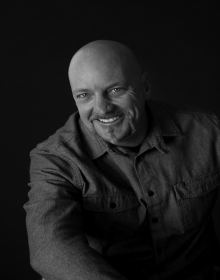 by Luke Schmaltz
by Luke Schmaltz
For the last 200,000 years, the human psyche has been overarchingly concerned with the physical world — aka the Outernet.
Even after the invention of the printing press in 1440, the focus of most humans was on food, water, shelter, weather, the changing seasons, the nighttime sky, flora, fauna, and other groups of nearby people.
The fascination with inward worlds, other than stories passed on through hieroglyphs and the oral tradition, most certainly began with the written word. Yet, it did not explode across the mindscape of civilization until complex ideas could be produced en masse. While the printing press has most certainly been an inimitable tool in the furthering of civilization through the sharing of information, it also gave rise to the desire for an ever more efficient way of exchanging ideas.
Progress In Overdrive
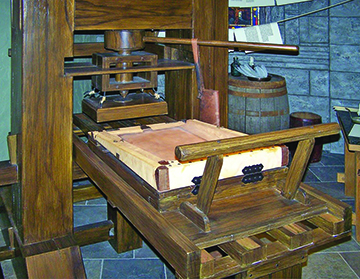
The printing press, while part of the Outernet, could be considered the proto-Internet.
Then, in the 1990s, the rising popularity of a global computer network — aka the Internet — began to deliberately eclipse the Outernet. In a span of less than 30 years, this phenomenon has completely changed how most Americans interact — not only with each other — but with the world around them. For some, the importance of the Outernet is becoming increasingly dismissed, as folks who are immersed in the digital world delve deeper into a set of stimuli which the human brain and nervous system are not equipped to handle on a full-time basis.
In scenarios of extreme overuse — such as video game addiction — too much screen time can ruin your life, and at the very least, can waste large portions of it while infecting you with twin cases of depression and social ineptitude. Yet, just as the bastard children of the printing press are tabloid newspapers, social media platforms are the unholy spawn of the Internet.
According to a June 2021 report on a study performed by the Reboot Foundation, “There is a disconnect between how people see the impact of social media on society and how they view it on an individual level. Despite their concern about social media’s impact on public mental health, most individuals seem ambivalent about the role of social media in their own lives. To put it bluntly, everyone seems to think their own relationship to social media is healthier than the average. This was clear in the survey. Over 70 percent of users said they would not give up their social media accounts for less than $10,000. Even more surprising, more than 40 percent said they would give up their TV, car, or pet before they disabled their social media pages.

Instead of gaming, thumb-typing, and scrolling all day — you can learn music or do something otherwise productive.
But despite being open to giving up Fido for Facebook, only about a third of respondents reported taking steps to limit their social media use, like turning off phones periodically or limiting content on their feeds.”
A Host Of Hindrances
While social media and gaming are among the most popular Internet/screen time fixations, these activities are rivaled (and accompanied) by instant messaging, email, gambling, watching videos, shopping, banking, streaming music, swiping through dating apps, and the list goes on and on. Plainly put, many people are spending too much time online and in front of LED screens. In doing so, they are becoming increasingly depressed and unable to effectively interact with the Outernet. Thankfully, there are a few strategies which, if applied deliberately, can help you extract yourself from the digital world and rediscover the other world that has been waiting just outside your field of vision.

Using the alarm clock app on your cell phone can seriously diminish the quality of your sleep.
Wake Up With Analog
Before you go to bed, consider turning your phone off for the night and using the antiquated yet time-tested method of awakening to an alarm clock. This way, you can remove the temptation of scrolling through your Instagram feed as you lay in bed at night and waking up to a bunch of notifications of things that happened while you were asleep.
Turn Them Off
Speaking of annoyances, if you disable your visual and audible notifications permanently, you can minimize how often you are distracted by an incoming email, a social media like, or an instant message. By doing so, you can take back autonomy over your time and your ability to focus on the task at hand rather than constantly being pulled away from what you are doing by tiny digital signals.
Put It Down
Whether your smartphone is glued to your hand 24/7, or if you are a semi-casual user, it is important to look forward while crossing the street, to drive undistracted, and to take in a sunset without checking your email. Plus, if you go for a walk without your phone, you might end up having a conversation with a neighbor, watching the fall leaves flutter down from the tree branches, or avoid walking into one of these trees because you’re staring down at your phone.
Replace The Habit

Too much screen time, gaming, and social media can be bad for one’s health.
If gaming is becoming a full-time fascination and you haven’t showered for a week or seen the sun for as long, perhaps it’s time for a new hobby. Since you love the competitive, exciting nature of video games, consider hiking, martial arts, team sports, or regular trips to local amusement parks. If you’re a computer nerd at heart, perhaps applying your aptitude by learning to write code is a viable pursuit. If your imagination craves stimulation, you can forgo your Instagram feed for a dip into a thick, handheld piece of fantasy fiction — aka a good book.
Use Your Hands
Incessant scrolling, texting, and game console handling are all manual skills which take repetition and coordination to develop. What they do not develop, however, is an auditory talent which can help you connect with others. Rather than twiddling with your phone and fidgeting with your keyboard all day, consider learning to play the guitar, the piano, the harmonica, or some other musical instrument. These highly cerebral endeavors have much of the same effort/reward effect as gaming without the negative, addictive elements. Plus, playing music carries a far more long-term sense of accomplishment and fulfillment than just about any online activity.
It is a fact that the Internet is here to stay and is essential to the functions of modern life. But the Internet is predated by the Outernet, which the human psyche is far more attuned to for achieving genuine happiness and personal fulfillment. By all means keep your phone, just turn it off every once in a while, gaze out the window, and see what happens.

by Mark Smiley | Jan 21, 2022 | Travel
by Mark Smiley
 Wynkoop Brewing and Head Brewer Todd Bellmyer have brewed a new West Coast IPA beer, Much Needed Moisture IPA, to help those impacted by the Boulder wildfire. All proceeds from sales of this beer will be donated to the Boulder County Wildfire Fund. This beer launched on Friday, January 14, at Wynkoop Brewing Company, Ale House Denver, and both Cherry Cricket locations. Wynkoop’s parent company will make a 1:1 matching donation.
Wynkoop Brewing and Head Brewer Todd Bellmyer have brewed a new West Coast IPA beer, Much Needed Moisture IPA, to help those impacted by the Boulder wildfire. All proceeds from sales of this beer will be donated to the Boulder County Wildfire Fund. This beer launched on Friday, January 14, at Wynkoop Brewing Company, Ale House Denver, and both Cherry Cricket locations. Wynkoop’s parent company will make a 1:1 matching donation.
The golden hued brew features copious amounts of six different hop varieties and an ABV of 6.7%. The aroma is slightly tropical with a light bitterness and that classic West Coast IPA flavor.
Wynkoop Brewing opened in 1988 in Lower Downtown Denver and is Colorado’s first brewpub. For nearly 35 years, they have been brewing handcrafted beer in the basement brewery underneath Denver’s largest pool hall. Over the years the neighborhood has transformed and Colorado’s craft beer industry has exploded.

Fundraiser: All proceeds of the sale of Much Needed Moisture IPA benefits the Boulder County Wildfire Fund. The beer is available at Wynkoop Brewing Company, Ale House Denver, and both Cherry Cricket locations.
In addition to craft beer, Wynkoop offers an extensive menu complete with items such as nachos, mussels, a variety of salads, burgers, short ribs, pasta, and more. Executive Chef Chris Collins takes pride in the menu that he has put together. Collins is no stranger to Denver as he was the head chef at the Inn at Cherry Creek, a now closed popular spot in Cherry Creek North.
Wynkoop Brewing is located at 1634 18th Street in Denver. Visit wynkoop.com for more information or follow them on Instagram @wynkoopbrew.




















